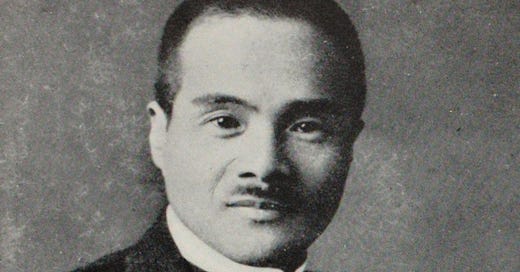Tanabe Hajime and 'Other-power'
YESTERDAY, I was discussing Tanabe Hajime (pictured) in the context that he waged an intellectual assault against the philosophy of Nishida Kitarō with the objective of undermining what he saw as Japan's "closed society" in readiness for a new era of rapid Westernisation. Tanabe was also influenced by the Marxist thought that was beginning to creep into the country and had visited Germany to study the ideas of Kant, Hegel and Heidegger. Shortly after Japan's obliteration by American bombers during the Second World War, Tanabe produced his Philosophy as Metanoetics (1946) as a direct attack on his country's imperial past and Japanese identity in general.
Having redefined Nishida's interpretation of absolute nothingness in line with his own insistence that consciousness must undergo a process of historical conditioning by way of negation, Tanabe developed the idea that all absolute nothingness really amounts to is a form of absolute mediation. This "Other-power," as he described it, is a Kantian undertaking of death-and-resurrection that orientates the active self as the seeking-out of an Idea. This is a form of self-awareness that is achieved through reflection and, thus, reinforced by absolute nothingness itself.
Tanabe's later work, Hegel’s Philosophy and the Absolute Dialectic (1963), reveals the extent to which he was influenced by the argumentative discourse that had arrived in Japan prior to the Second World War. This, naturally, came in the shape of Marxism and Tanabe fused the left-leaning dialectics of the nineteenth-century Young Hegelians with Kantian ethics. In addition, Hegel's own speculative approach was transformed into a more active interpretation involving absolute nothingness. However, the meditation aspect went no further than to present the self as something which became a subject of moral behaviour. Nishitani Keiji explains:
"As a result, Tanabe was left with two alternative strategies to see his approach through to the end: either the self itself would have to be turned inside out into a self of praxis by directly assuming a standpoint of the subject based on absolute nothingness; or the self would have to be turned in on itself as a relative being so that it could no longer emerge in praxis and action, this despair in turn effecting a conversion that would bear witness to the absolute nothingness that made it possible. The former alternative would mean the thoroughgoing pursuit of an approach of 'self-power'; the latter, an orientation towards absolute Other-power."
Tanabe's system was designed to encourage a process of death-and-resurrection, with the active subject dying through absolute negation and then being reborn. Consequently, by denying "radical evil" the ground of the subject is changed into absolute nothingness and is thereby maintained. Returning to Nishitani, who preferred Nishida's own analysis of absolute nothingness:
"Life through death in the true sense has not yet occurred. There is a sense in which the continuity of the standpoint of praxis and the self-identity of the subject have yet to be left behind. This is not true absolute negation."
True negation involves the destruction of the subject's self-identity and this brings to an end to the praxis. Furthermore, Tanabe's absolute nothingness appears as an absolute Other that is opposed to the self and therefore becomes a "dialectic of paradox" in which the self returns as a "self that is not a self".
Tanabe claimed to have arrived at this conclusion after wishing to express his "repentance" for the War. The resurrection that one finds lurking at the end of his dialectical theory is said to convey a type of self-denial as compassion, although to me it seems like a tempering process that ends in intellectual castration. After all, Nishida's philosophy rests on the idea that the self is the self-expression of the world and this involves an infinite number of creative individuals. By contrast, Tanabe tries to present the self as a relative power that is negated through repentance. The very idea of empowerment is completely absent from Tanabe's philosophy, for the self merely begins as a sinful being that is reborn through its encounter with absolute nothingness and yet remains ignorant in the sense that nothing remotely significant may be gleaned from such an encounter. It is here, at least in spirit, that Tanabe accords with the Socratic paradox that one can be aware of nothing other than the fact of knowing nothing. As Nishitani concludes:
"The self's original countenance of an ignorant sinner is none other than this: it is an irredeemably ignorant mortal."




